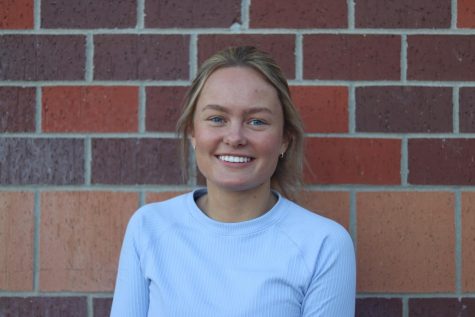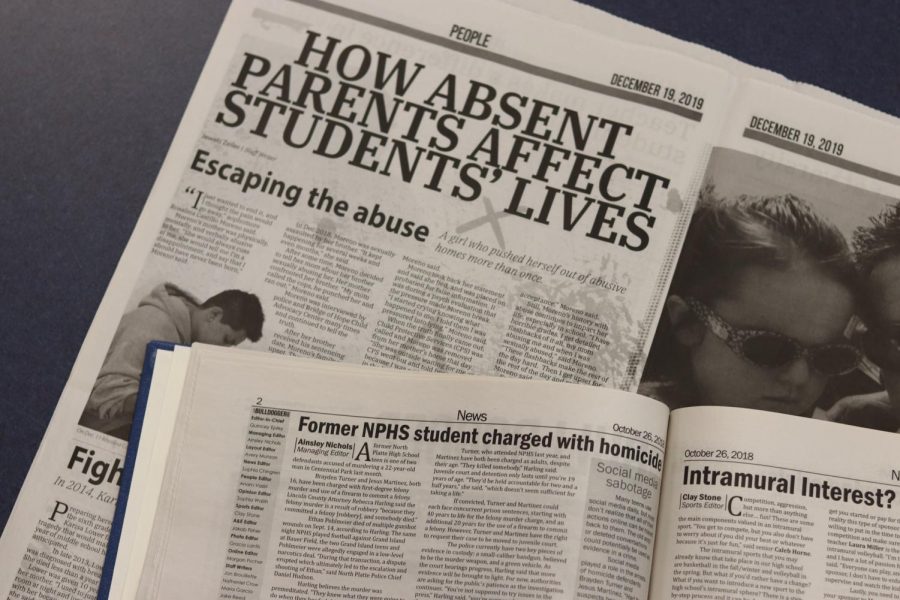Where is the line drawn?
The debated topic of media privacy
The two spotlight stories written about Rosalina Castillo Moreno and Brayden Turner. “How Absent Parents Affect Student’s Lives” was published in December of 2019 and “Former NPHS student charged with homicide” was published in October of 2018. Castillo Moreno’s story was about her experiences with absent parents, and Turner’s featured his brother, a former NPHS student, who was charged with first-degree felony murder and use of a firearm to commit a felony.
Where is the line drawn? For many years, “The North Platte Bulldogger” has been doing spotlight features on students who have unique stories to share, but what makes it okay to release their private information?
According to the Society of Professional Journalists Code of Ethics (which is the constitution most professional journalists abide by) a journalist’s main job is to “seek truth and report it,”and this is one of their most fought battles. The second stanza says to “minimize harm,”and to “treat sources, subjects, colleagues and members of the public as human beings deserving of respect.”
Sophomore Eithyn Turner said he felt disrespected when “The Bulldogger” reported on his brother (and former NPHS student) Brayden Turner for being charged with first degree murder and use of a firearm to commit a felony.
When Turner was informed of his brother’s story being reported in “The Bulldogger”, he reacted very angrily. Turner threw away all of the newspapers at school. “It made me mad because I felt as if the school did not have a right to release that information when it was not even publicly announced yet,” Turner said, “It invaded my privacy and put my last name around the school,” said Turner. But, “The Bulldogger” reported Brayden’s story a week later, so his case actually was publicly announced prior to the school newspaper’s report.
Even if Eithyn Turner felt embarrassed, the newspaper staff took all precautions to leave his name out of their report. But is embarrassment a factor of privacy? Referring back to the SPJ Code of Ethics, a journalist has the right to “seek truth and report it.” Therefore, this was truly not an invasion of Eithyn’s privacy if his name was not mentioned once in the passage, and “The Bulldogger” had the right to report the topic. The facts in the article came from direct sources.
This has also been an ongoing debate in the national media world for celebrity news channel TMZ has been caught multiple times false reporting. For instance, according to “Elite Daily,” TMZ claimed Miley Cyrus died in a car accident; completely false. They mistaked Greg Oden for Lebron James; completely inaccurate. And lastly, they admitted to posting a fake photo of JFK. This is an example of false news, but Brayden Turner’s story was not.
Sophomore Rosalina Castillo Moreno also had a spotlight featured in the Bulldogger this winter, and she felt as if her story being released was not all the positive feedback she anticipated. “How absent Parents Affect Students’ Lives” talked about how Castillo Moreno was moved from home to home and was sexually abused. “People really reacted on the bad side more than the good side,” Castillo Moreno said. She explained how people thought she was making it up for attention. This made her sad and caused her to think twice about exposing her personal life. “At least I know the truth and that is all that matters,” said Castillo Moreno.
But despite her own outcome of the story being published, Castillo Moreno expressed that it was important to do features, “A person can know what you are going through and cannot judge you for it,” Castillo Moreno said. Featuring the personal story of someone helps others relate through the experiences.
Turner and Castillo Moreno both had their private lives exposed to the public, but they also have different outlooks on the effect. So which is right? In both scenarios, it was okay to release the story. These are both circumstances that have affected the lives of students at North Platte High. Touchy subjects can be difficult to discuss, but the honesty in journalism relies on the entire truth and not settling for fake news.

I am currently a senior, and this is my first year doing journalism. I joined because I love to write and express my opinions. I also enjoy rhyming sentences...

